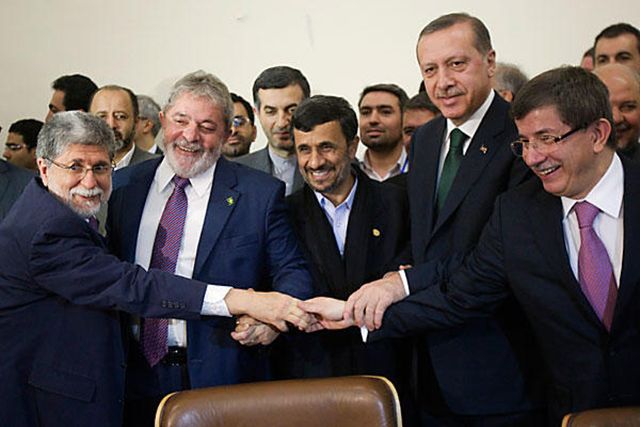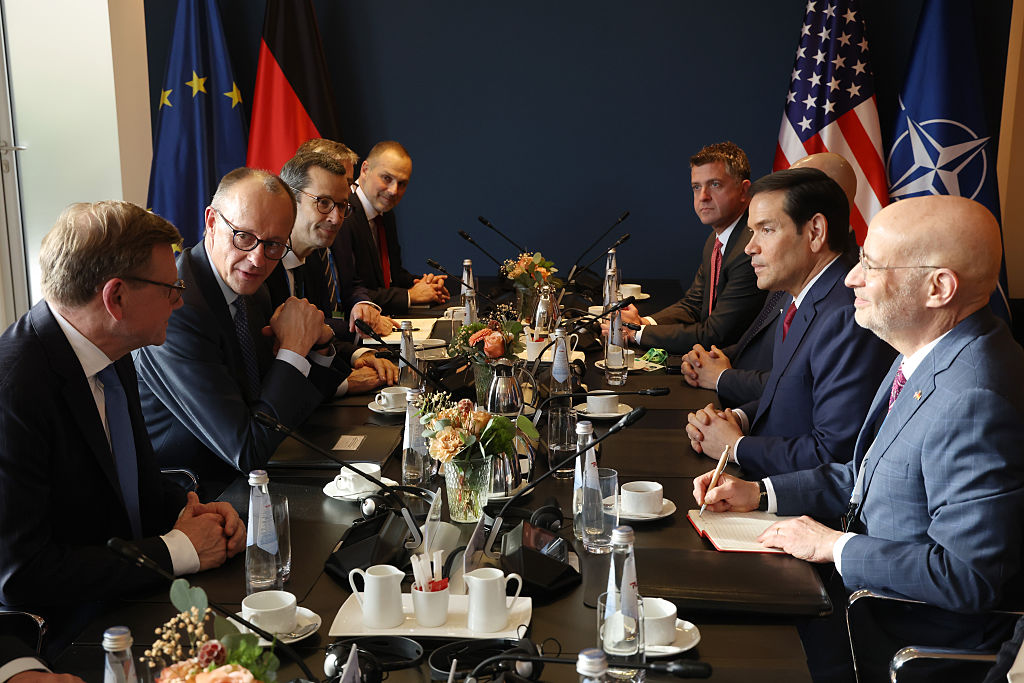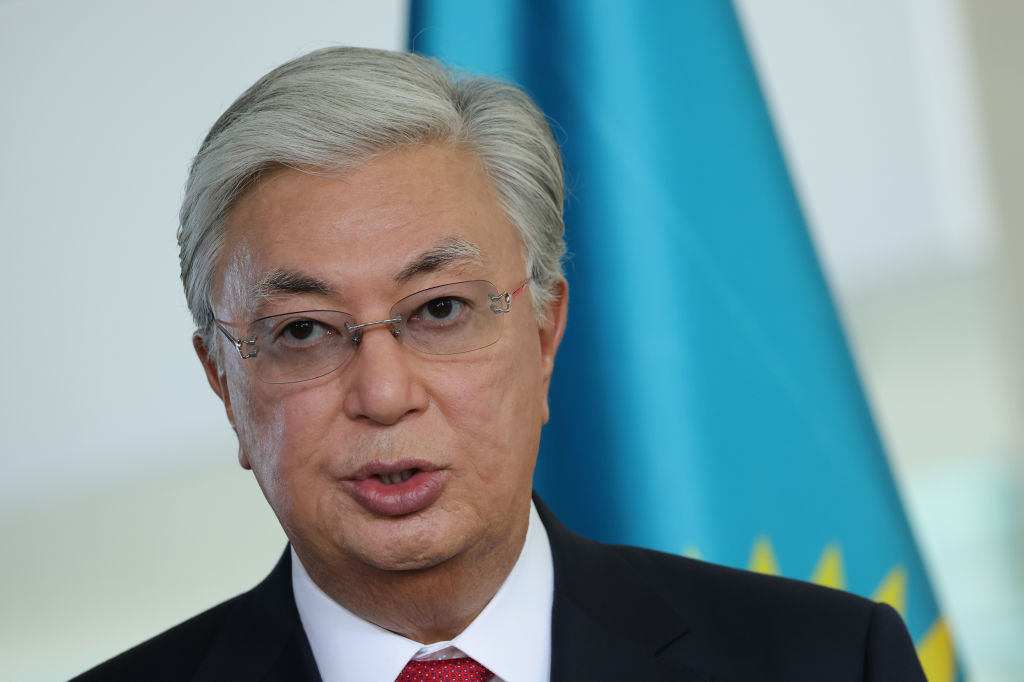
The Iranian Trap for Medvedev’s Opportunistic Foreign Policy
The Iranian Trap for Medvedev’s Opportunistic Foreign Policy
The draft resolution on new sanctions against Iran introduced by the US at the UN Security Council last Tuesday has caught Moscow in a trap set primarily by its own unprincipled diplomatic maneuvering. On previous occasions, Moscow tried to reconcile the pragmatic bargaining with the US and its “good-neighborly” partnership with Iran, but now the intrigue is far more complicated. Russian-Iranian relations have visibly shrunk, even if Rosatom still promises to launch the Bushehr nuclear power station in August (RIA Novosti, May 20). A new dimension in the protracted international controversy around the Iranian nuclear program was opened by the trilateral deal involving Brazil and Turkey that was announced in Tehran last week. The technicalities of the swap are yet to be presented to, and approved by, the International Atomic Energy Agency (IAEA), but the substance is clear: Iran entrusts 1200 kilograms (kg) of its low-enriched uranium to Turkey for safe-keeping and receives 120 kg of highly-enriched uranium from Brazil (Kommersant, May 18; Nezavisimaya Gazeta, May 19).
This deal does not slow down uranium-enrichment activities in Iran, consequently pressure from the UN would be entirely justified, but Russia has agreed to execute new ‘smart’ sanctions (which are certain to have zero impact on Iranian nuclear ambitions) primarily in order to proceed with the “reset” in relations with the US. Washington has indeed lifted its unilateral ban on contacts with several Russian companies and colleges (including Rosoboronexport) suspected of contributing to missile and nuclear projects in Iran (www.newsru.com, May 22). Moscow, has granted support to the Turkish-Brazilian initiative, perhaps never expecting it to succeed because its own proposals had failed. Neither Turkey nor Brazil is gravely concerned about Iran accessing advanced nuclear technologies, but both countries are eager to boost their international prestige by succeeding in resolving a pivotal and intractable issue (www.gazeta.ru, May 20). They have good reasons to be proud of their achievement, but the US demand for sanctions clearly devalues it and Moscow’s support for the draft resolution amounts, in their eyes, to a betrayal of trust.
This diplomatic blunder is undeniably personal because President, Dmitry Medvedev, had persistently sought to become involved in the talks. He discussed the Iranian issue with Prime Minister, Recep Tayyip Erdogan, while visiting Turkey on May 12-13, then called US President, Barack Obama, and greeted in Moscow the Brazilian President, Luiz Inacio Lula da Silva, who was bracing himself for 18 hours of hard bargaining in Tehran. It is impossible to fathom what kind of suggestions and promises Medvedev gave his counterparts, but it is known that Erdogan called Prime Minister, Vladimir Putin ,on May 19 seeking to secure more meaningful support for the swap deal. Russian Foreign Minister, Sergei Lavrov, now tries to convince his US counterpart, Hillary Clinton, that the atmosphere has become favorable for resuming political efforts, but Washington is adamant on a new resolution (despite objections from Brazil and Turkey) and Russia cannot retreat from its consent not to use its veto (Vremya Novostei, May 20).
Whatever the outcome of the unusually multi-polarized debates in the UN Security Council, it is already clear that in Russian foreign policy this duplicity (or perhaps even triplicity) is not an isolated episode, but a feature determined by its new “pragmatism.” Two weeks ago a draft guideline-setting document from the foreign ministry was leaked to the media and emphasized a pronounced shift in priorities towards improving relations with many partners and abandoning a confrontational stance (Russian Newsweek, May 9). The main thrust of the foreign policy, according to this “doctrine,” is on securing external involvement in Russia’s modernization, and many recent compromises, such as the rapprochement with Poland and settling the maritime border dispute with Norway, appear to fit this pattern. Medvedev has indeed adopted a “smiles-and-smooth-talking” style, which contrasts positively with Putin’s often terse and caustic behavior (The Moscow Times, May 19). The key proposition beneath these stylistic differences, however, is that the global crisis has undermined the US leadership and eroded the EU cohesion –and thus has created new opportunities for Russia that must be carefully exploited in a cooperative rather than confrontational climate (Ezhednevny Zhurnal, May 20).
This proposition is not without rational assessment, particularly as far as the consequences of the deeper than expected crisis in the EU structures of governance are concerned, but it underestimates the scope of Russia’s own weakening and marginalization. Moscow could have perhaps acquired a new position of strength –in “soft power” terms– vis-à-vis Ukraine, which has suffered a near catastrophic economic contraction and cannot count on any “rescue packages” from the EU or US (Nezavisimaya Gazeta, May 20). Russia cannot, however, project any meaningful influence even in Central Asia, where the implosion of Kyrgyzstan could be merely the beginning of the end for despotic regional stability (Vremya Novostei, May 21). Imagining Russia as one of the “emerging powers” on a par with Brazil or India, the makers of Medvedev’s foreign policy remain in denial of the profound crisis of its state fundamentals.
Current economic statistics show the picture of an uncertain recovery, but perhaps the most telling figure is the sustained decline in foreign investments, which has registered a five-year low in the first quarter of 2010, and the high level of “capital flight,” primarily to Switzerland (Vedomosti, May 21). This may be the most definite “litmus test” of Medvedev’s opportunistic foreign policy, in which flexible tactical maneuvering brings a sustained erosion of trust. Spinning the discourse of “innovations” Medvedev is in fact presiding over Russia’s continuing de-modernization, determined not by the high profitability of raw materials extraction and export, but by the bureaucratic super-structure that expropriates and consumes these profits. The unavoidable tightening of budget expenditures in the political system based on rent-extraction and glued together by corruption would lead to both more ruthless predation and more destructive clan feuds. In this situation, a policy of exploiting other states’ troubles guarantees that your own troubles would also be seen as someone’s opportunities.


